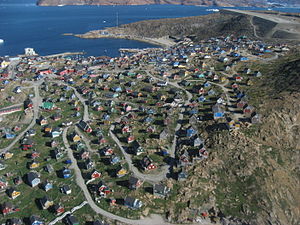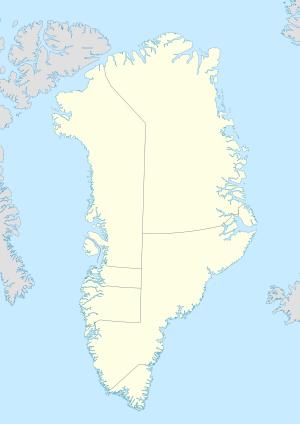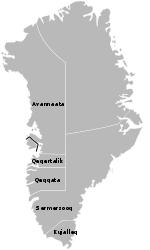Upernavik
Upernavik
Vårvig | |
|---|---|
 Upernavik in July 2007 | |
| Coordinates: 72°47′13″N 56°08′50″W / 72.78694°N 56.14722°W | |
| State | |
| Constituent country | |
| Municipality | Avannaata |
| Population (2024) | |
• Total | 1,064[1] |
| Time zone | UTC−02:00 (Western Greenland Time) |
| • Summer (DST) | UTC−01:00 (Western Greenland Summer Time) |
| Postal code | 3962 |
Upernavik (Danish: Vårvig) is a small town in the Avannaata municipality in northwestern Greenland, located on a small island of the same name. With 1,064 inhabitants as of 2024,[2] it is the twelfth-largest town in Greenland. It contains the Upernavik Museum.
History
[edit]
The town was founded as Upernavik in 1772.[3] From the former name of its island, it was sometimes known as Women's Island; its name was also sometimes Anglicized to "Uppernavik".[4]
In 1824, the Kingittorsuaq Runestone was found outside the town. It bears runic characters left by Norsemen, probably from the late 13th century. The runic characters list the names of three Norsemen and mention the construction of a rock cairn nearby.
This is the furthest north that any Norse artifacts have been found, other than those small artifacts that could have been carried north by Inuit traders, and marks the northern known limit of Viking exploration.
Sailors searching for lost polar expeditions sometimes used the city as a staging ground.[5]
Transport
[edit]Upernavik is served by Air Greenland, with scheduled flights from Upernavik Airport to Qaanaaq, Qaarsut, and Ilulissat.[6] Most settlements in the archipelago are served during weekdays with the Bell 212 helicopter.[6]
AUL ferries have ceased passenger services north of Ilulissat, leaving Upernavik totally dependent on Air Greenland services, which are frequently cancelled due to weather conditions. Cargo arrives several times a year on Royal Arctic Line when sea ice permits, usually beginning in early to mid May annually.
Archipelago
[edit]Upernavik is located within Upernavik Archipelago, a vast archipelago of small islands on the coast of northeastern Baffin Bay. The archipelago extends from the northwestern coast of Sigguup Nunaa peninsula in the south at approximately 71°50′N 56°00′W / 71.833°N 56.000°W[7] to the southern end of Melville Bay (Greenlandic: Qimusseriarsuaq) in the north at approximately 74°50′N 57°30′W / 74.833°N 57.500°W.[8]
Population
[edit]
With 1,092 inhabitants as of 2020, Upernavik is the third-largest town in the Avannaata municipality.[9][10] The population has been relatively stable over the last two decades and has increased by more than 28% relative to the 1990 levels,[9] with migrants from the smaller settlements in the archipelago helping keep the population level stable. Cyclist Hanne Malmberg was born in Upernavik. She represented Denmark at the 1992 Summer Olympics.[11]
Climate
[edit]Upernavik has a tundra climate (Köppen climate classification ET). Winters are very cold and snowy and summers are quite cool. With a mean of just 6.4 °C (43.5 °F) in July, trees are unable to grow. Autumn and winter are the wettest time of the year and spring is the driest.
| Climate data for Upernavik (1991–2020 normals, extremes 1958–2020) | |||||||||||||
|---|---|---|---|---|---|---|---|---|---|---|---|---|---|
| Month | Jan | Feb | Mar | Apr | May | Jun | Jul | Aug | Sep | Oct | Nov | Dec | Year |
| Record high °C (°F) | 11.0 (51.8) |
8.0 (46.4) |
10.0 (50.0) |
9.4 (48.9) |
15.0 (59.0) |
18.0 (64.4) |
22.6 (72.7) |
19.9 (67.8) |
14.3 (57.7) |
13.0 (55.4) |
9.6 (49.3) |
12.2 (54.0) |
22.6 (72.7) |
| Mean daily maximum °C (°F) | −14.3 (6.3) |
−16.5 (2.3) |
−16.0 (3.2) |
−8.9 (16.0) |
−0.9 (30.4) |
6.2 (43.2) |
9.4 (48.9) |
8.2 (46.8) |
3.3 (37.9) |
−1.8 (28.8) |
−5.9 (21.4) |
−9.4 (15.1) |
−3.9 (25.0) |
| Daily mean °C (°F) | −16.7 (1.9) |
−19.2 (−2.6) |
−19.0 (−2.2) |
−11.9 (10.6) |
−3.3 (26.1) |
3.2 (37.8) |
6.4 (43.5) |
5.7 (42.3) |
1.4 (34.5) |
−3.4 (25.9) |
−7.6 (18.3) |
−11.4 (11.5) |
−6.3 (20.6) |
| Mean daily minimum °C (°F) | −18.9 (−2.0) |
−21.6 (−6.9) |
−21.7 (−7.1) |
−14.7 (5.5) |
−5.5 (22.1) |
0.6 (33.1) |
3.8 (38.8) |
3.6 (38.5) |
−0.2 (31.6) |
−4.9 (23.2) |
−9.2 (15.4) |
−13.3 (8.1) |
−8.5 (16.7) |
| Record low °C (°F) | −34.9 (−30.8) |
−38.4 (−37.1) |
−39.0 (−38.2) |
−30.2 (−22.4) |
−22.6 (−8.7) |
−7.5 (18.5) |
−4.0 (24.8) |
−3.8 (25.2) |
−12.2 (10.0) |
−14.5 (5.9) |
−25.6 (−14.1) |
−31.6 (−24.9) |
−39.0 (−38.2) |
| Average precipitation mm (inches) | 12 (0.5) |
13 (0.5) |
8 (0.3) |
14 (0.6) |
10 (0.4) |
14 (0.6) |
29 (1.1) |
26 (1.0) |
38 (1.5) |
33 (1.3) |
34 (1.3) |
20 (0.8) |
251 (9.9) |
| Average precipitation days (≥ 0.1 mm) | 9.1 | 8.6 | 6.9 | 9.1 | 8.3 | 7.6 | 9.2 | 8.7 | 12.6 | 13.5 | 16.2 | 14.9 | 123.4 |
| Average snowy days | 9.0 | 8.5 | 6.7 | 9.0 | 7.8 | 5.5 | 1.0 | 0.7 | 8.2 | 12.8 | 15.9 | 14.7 | 98.4 |
| Average relative humidity (%) | 80.6 | 80.7 | 79.3 | 80.0 | 83.8 | 80.3 | 77.7 | 77.9 | 79.0 | 80.0 | 78.4 | 79.9 | 79.8 |
| Mean monthly sunshine hours | 0 | 18 | 106 | 214 | 234 | 225 | 271 | 214 | 104 | 38 | 2 | 0 | 1,426 |
| Source: Danish Meteorological Institute (precipitation and snow 1958–1981, humidity 2005-2020, sun 1931–1960)[12][13][14][15] | |||||||||||||
References
[edit]- ^ "Population in Localities January 1st 1977-2024". Statbank Greenland.
- ^ "Population in Localities January 1st 1977-2024". Statbank Greenland.
- ^ Colton, G.W. "Northern America. British, Russian & Danish Possessions In North America." J.H. Colton & Co. (New York), 1855.
- ^ Walker, J. & al. "British North America." Baldwin & Cradock (London), 1844.
- ^ Sides, Hampton. In the Kingdom of Ice: The Grand and Terrible Polar Voyage of the USS Jeannette. p. 6.
- ^ a b "Air Greenland, Departures and Arrivals". Archived from the original on 9 March 2010. Retrieved 8 May 2010.
- ^ Nunavik, Saga Map, 1:250.000, Tage Schjøtt, 1992
- ^ Upernavik Avannarleq, Saga Map, 1:250.000, Tage Schjøtt, 1992
- ^ a b c "Population by Localities". Statistical Greenland.
- ^ "Kommuni pillugu". Avannaata Kommunia.
- ^ Evans, Hilary; Gjerde, Arild; Heijmans, Jeroen; Mallon, Bill; et al. "Hanne Malmberg Olympic Results". Olympics at Sports-Reference.com. Sports Reference LLC. Archived from the original on 18 April 2020. Retrieved 27 August 2016.
- ^ "DMI Report 21–12: Climatological Standard Normals 1991-2020 - Greenland" (PDF). Danish Meteorological Institute. Retrieved 12 January 2022.
- ^ "DMI Report 18–19: Climatological Standard Normals 1981–2010 Denmark, The Faroe Islands and Greenland Based on Data Published in DMI Reports 18–08, 18–04 and 18–05" (PDF). Danish Meteorological Institute. Archived from the original (PDF) on 10 February 2019. Retrieved 14 October 2019.
- ^ "The Observed Climate of Greenland, 1958–99 with Climatological Standard Normals, 1961–90" (PDF). Danish Meteorological Institute. Retrieved 14 October 2019.
- ^ Cappelen, John; Jensen, Jens. "GRØNLAND - Upernavik" (PDF). Climate Data for Selected Stations (1931-1960) (in Danish). Danish Meteorological Institute. p. 113. Archived from the original (PDF) on 27 April 2013. Retrieved 14 October 2019.
Further reading
[edit]- Bjerregaard, Peter, and Beth Bjerregaard. Disease Pattern in Upernavik in Relation to Housing Conditions and Social Group. Copenhagen: Kommissionen for videnskabelige Undersøgelser i Grønland, 1985. ISBN 87-17-05231-9
- Haller, Albert Arno. The Spatial Organization of the Marine Hunting Culture in the Upernavik District, Greenland. Ottawa: National Library of Canada, 1981.
- Hjarnø, Jan, Jørgen Balslev Jørgensen, and Morten Vesely. Archaeological and Anthropological Investigations of Late Heathen Graves in Upernavik District. København: C.A. Reitzels Forlag, 1974. ISBN 87-421-0096-8
- Jørgensen, Jørgen Balslev, Jens Dahl, and Sanjai Sangvichien. Anthropometrical Studies on Greenlanders from Two Villages in the Upernavik Area. København: Nyt Nordisk Forlag, 1976. ISBN 87-17-02125-1
- Vibe, Christian. Preliminary Investigations on Shallow Water Animal Communities in the Upernavik- and Thule-Districts (Northwest Greenland). København: C.A. Reitzel, 1939.


